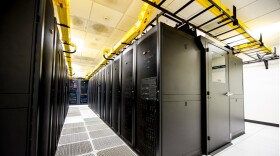Environmental groups are raising concerns over resource use and pollution in connection with legislation Governor Gretchen Whitmer has signed over the last couple of months incentivizing technology companies like Google and Microsoft to build data centers in Michigan.
In an age of artificial intelligence, cryptocurrency mining, and cloud computing, big technology companies are building data centers to house computer systems and associated applications and data.
Data centers store, manage, and process data used for daily digital services. Companies such as Microsoft have recently acquired property in Kent County and Allegan County for possible future data centers.
While there are already data centers in Michigan, they are smaller and less energy intensive than some of the large data centers being built throughout the country — like in Virginia and Arizona — according to Charlotte Jameson, chief policy officer at the Michigan Environmental Council.
“We are at a really pivotal moment right now in that we don't have any of these large-scale data centers in Michigan yet,” Jameson told Michigan Public. “We do have other data centers, but we don't have any of these really, really massive ones yet. And so we're in a good place to make sure that we are approaching data center development thoughtfully and mitigating any negative impacts that we could see from them.”
Last month, Governor Gretchen Whitmer signed House Bill 4906 into law, which gives qualified businesses a tax break on data center equipment sales. The tax exemption applies to corporations in Michigan that have established at least 1,000 jobs in or related to the data center industry between January 2016 and January 1, 2026. The bill passed with bipartisan support in the state House and Senate.
A Whitmer administration press release said that bill would help create jobs and expand professional talent in Michigan, saying jobs and increased tax revenue from data centers “could provide Michigan communities with tens of millions of dollars for schools and operating costs.”
Whitmer also signed Senate Bill 237 on December 30. The legislation states that the sale of data center equipment or the sale of storage, use, or consumption of data center equipment to a qualified data center or a business involved in their construction will not be taxed.
Michigan Senator Kevin Hertel (D-St. Clair Shores), who introduced the bill to the state Senate, wrote in a statement in May 2024 that more data centers will bring investment to Michigan communities.
“Data centers power everything from email and social media to search engines and online banking, and with increased investments in artificial intelligence, there is a growing demand for more data generation, processing, and storage,” the statement reads. “Not only do data centers serve as the backbone of our increasingly digital world, but they are economic engines that help fuel long-term community growth.”
Environmental concerns
While some Michiganders champion the benefits data centers could bring to their local communities, Michigan environmental groups have highlighted the environmental costs of the centers.
Data centers require batteries and generators for backup power in case of utility power loss. These backup generators or batteries are tested periodically and may utilize tens of megawatts of power to support a data center’s computational load. Generators using fossil fuels release diesel exhaust and nitrogen dioxide emissions.
Christy McGillivray, the political and legislative director of the Sierra Club’s chapter in Michigan, said these generators can cause environmental issues in the areas surrounding the data centers while increasing water and electricity rates.
“In many cases, there are hundreds and sometimes thousands of diesel generators hooked up to data centers to guarantee that even when there are power outages due to extreme weather events driven by climate change, the diesel backup generators can be there to maintain power at all costs for the data centers,” McGillivray said. “Those diesel generators are a significant source of really toxic air pollution for any communities living nearby.”
Data center electricity demand is projected to grow from 1% of global energy demand in 2022 to over 3% by 2030, according to the World Economic Forum.
“The impact of data centers across the country has made it really clear that they are stressing our electrical grids,” McGillivray said. “Across the country, they are leading to coal plants staying online, expanded gas infrastructure instead of proper renewable energy in order to make sure that we're meeting our climate targets.”
Jameson said recent legislation in Michigan does not ensure that technology companies factor in the full cost of data centers on the communities they impact.
“We are really hyper-focused in terms of trying to make sure that an average person's bills aren't going up to help subsidize the infrastructure needs of these new data centers,” Jameson told Michigan Public. “They’re some of the biggest tech companies in the world. They should be able to pay for their infrastructure.”







